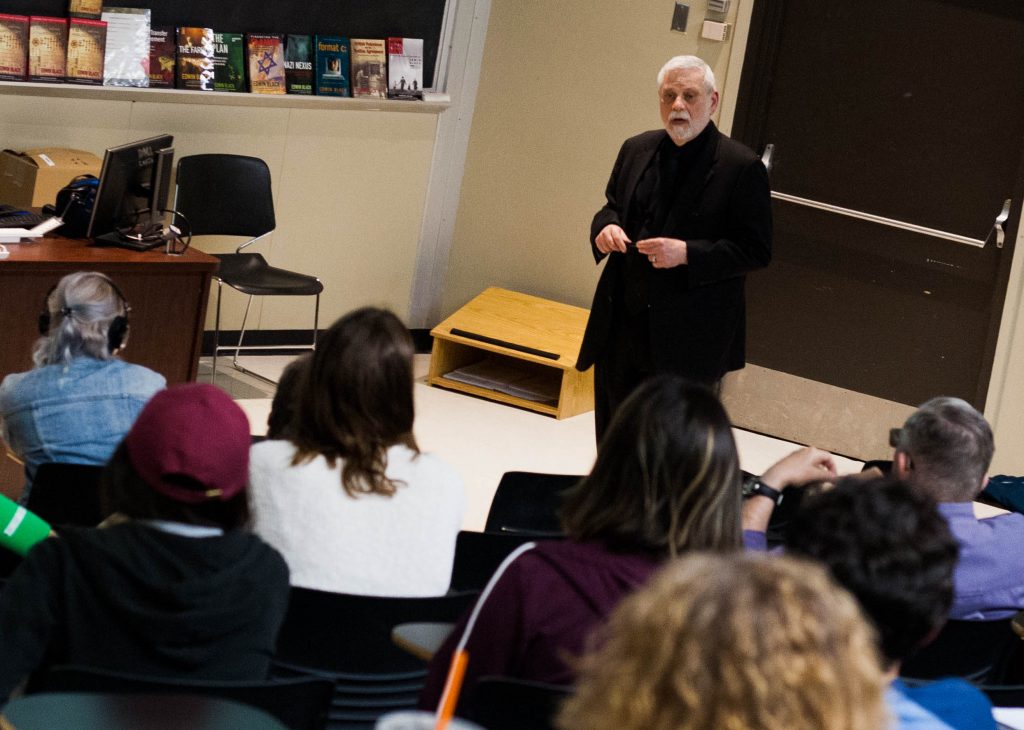
Edwin Black, author of “IBM and the Holocaust,” spoke in Lecture Hall 10 on Monday evening about the connection between the Nazi regime and Thomas J. Watson, the founder of IBM and the namesake of the Watson School of Engineering.
Black, whose parents were Holocaust survivors, started his research when he went to the U.S. Holocaust Memorial Museum in Washington, D.C., and saw an IBM machine on display with no context. He gathered about 50 researchers to determine what the IBM machine had to do with the Holocaust, and found that Watson and IBM were heavily involved in the mass genocide.
“The evidence was that Thomas J. Watson consciously micromanaged all six phases of the Holocaust from his offices in New York, and through his overseas subsidiaries,” Black said.
Black argued that without Watson’s organization technology, developed by IBM, the six phases of the Holocaust — identification, exclusion from society, confiscation of assets, ghettoization, deportation and extermination — couldn’t have been carried out as efficiently.
According to Black, Watson and IBM worked to develop punch cards for the German military. These punch cards stored information by running them through a reader, which detected each row and column with a hole. Information on the cards included religion, gender, levels of health, location and occupation. Additionally, each card had a number — the same numbers tattooed on prisoners in Nazi concentration camps.
The cards were used to track people and goods faster and more efficiently than ever before. During his presentation, Black highlighted documents and letters between Watson and high-ranking officials of the German military that implied Watson understood the mass genocide his technology was facilitating.
Michael Harel, a junior double-majoring in history and psychology, wrote an opinion piece in Pipe Dream on Oct. 9, 2017, advocating for Binghamton University to change the name of the Watson School of Engineering. He cited Black’s book in his column, and Black said that Harel’s article was one of the reasons he decided to speak at BU. According to Harel, Watson’s actions do not conform with the ethics taught at the engineering school.
“It is custom to name buildings, roads, monuments and the like after people we idolize,” Harel wrote. “People whose actions we seek to emulate and whose legacies we wish to cement into history. We must decide which values we stand for.”
Binghamton University said in a statement that Black’s lecture didn’t necessarily tell the whole story.
“Binghamton University does not take the position that Watson or IBM was without their faults,” the statement read. “However, most academic historians do not believe that Watson or IBM bears the responsibility Edwin Black, a popular writer, has assigned them. Nor do we think that the namesake solely defines the Watson School’s accomplishments and reputation since its founding.”
Cristian Valle, a senior majoring in environmental studies, heard about the event from Kelvin Santiago-Valles, a professor of sociology at the University. Valles said the event was informative and helped him develop an opinion on the issue.
“It’s pretty messed up,” Valles said. “I really didn’t know [about it] so it’s eye-opening. [I] would like to see it changed.”


